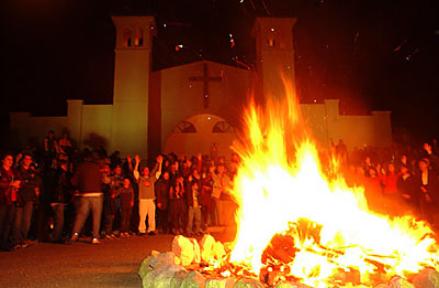
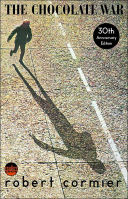 The Chocolate War, by Robert Cormier
The Chocolate War, by Robert Cormier
![]()
Stories for and about adolescents follow certain established conventions. Brave young boys and girls stand up to social and peer pressure, buck conformity, and do the right thing. They look bullies in the eye and the bullies back down. The bad guys lose. The good guys experience adversity but triumph in the end.
What the hell kind of story is The Chocolate War? Jerry Renault does the right thing and everyone — literally everyone — turns against him. The bullies don’t back down; on the contrary, they kick his teeth in, with the full backing of Brother Leon, the acting headmaster of Triinty School. The message? Conform or die. The bad guys always triumph, the good guys always and inevitably lose. Uh, I have just one question . . . how did Robert Cormier manage to find a publisher?
What I don’t question is why parents continually try to have this book taken off school reading lists (it’s been near the top of every banned book list published since 1974). It’s just too real for parents. They want their children to have a more idealistic picture of the world they’re inheriting. Of course, the world their children actually live in is the same world Jerry Renault lives in, but don’t tell their moms and dads that.
Interestingly, though, the essential cynicism of the book doesn’t seem to be what gets parents so het up. No. It’s the occasional references to masturbation. Don’t believe me? Follow this link to read an actual challenge to The Chocolate War, and marvel at the forces of puritanism still loose in the land.
This is a great story. If I had read it as a freshman or sophomore in high school, it would have had the same impact on me Joseph Heller’s Catch-22 did in my college years. I’m sorry I missed it, growing up. I’m glad I finally got around to reading it. It’s beautifully written, it’s true to life, it stays with you.
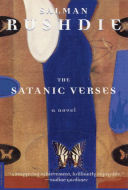 The Satanic Verses, by Salman Rushdie
The Satanic Verses, by Salman Rushdie
![]()
The Satanic Verses is first “adult” book on my banned books project list. It’s a brilliant novel, ambitious, complex, challenging, witty, and at moments deeply human . . . yet it comes across as an intellectual exercise, far removed from life as most of us live it. It never gripped me. Halfway through, I found myself looking for distractions, unconsciously avoiding picking this book up. As I found when I tried to read Gabriel Garcia Marzuez’ 100 Years of Solitude, magical realism and I just don’t get along . . . some deficit in my character, doubtlessly.
As for the banning: it’s not at all hard to understand why Muslim clerics denounced the book and put a fatwah on Rushdie; if I were to novelize the life of Jesus and give him human traits and doubts, along the way casting doubt on basic articles of faith and religious certainty, the fundies would burn me at the stake. But I lost my faith years ago, and I’ve long known there are no certainties in life, so these aspects of the book held little interest for me.
In the main, though, it’s that magical realism thing. It just leaves me cold. I would have loved The Satanic Verses had I read it in my teens or twenties. What I want now, though, is something real. Someone please pass the Roberto Bolaño!
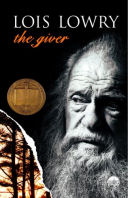 The Giver, by Lois Lowry
The Giver, by Lois Lowry
![]()
This was a fun, engaging read, a Margaret Atwood-style near-future story of a heavily-regulated conformist dystopia, and a young teenager’s dawning awareness of other possibilities, other ways to live. Although The Giver is aimed at teens, it’s a satisfying and memorable read for adults.
The Giver seems to me to be a book the kind of people who ban books would love. It’s a celebration of freedom, for goodness’ sake, and a ringing endorsement for the presence of God in human affairs. So why is it so often challenged at school board meetings across the land? Because in “the community” — the dystopia in which the story takes place — euthanasia and infanticide are practiced.
Children, of course, are plenty tough enough to read The Giver, and I can’t think of a child anywhere who wouldn’t benefit from reading it. Or many adults, either.
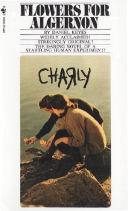 Flowers for Algernon, by Daniel Keyes
Flowers for Algernon, by Daniel Keyes
![]()
Another “young adult” book that easily qualifies as adult fiction, Flowers for Algernon is the story of Charlie, a retarded adult who participates in a medical experiment designed to not only heal, but improve his brain. He becomes super-intelligent, learns several languages, and even takes over his own experiment . . . only to predict its eventual sad end. Along the way he recovers disturbing childhood memories, learns the truth about people he had once considered friends, and begins to relate, no longer as a child but as an adult, to other adults. Which includes sex, the focus of effort after effort to have the book banned from school libraries and teaching curricula, even though Charlie’s experiences with women are written in a decidedly vague and non-pornographic manner.
When I went to high school in the 60s, people were just beginning to de-institutionalize and mainstream mentally-challenged kids. There were a few in my high school class. This book would have had an enormous impact of me and my classmates, at the very least in terms of teaching us understanding and compassion. Hell, it’s having an enormous impact on me as an adult!
Flowers for Algernon is a fascinating, compelling novel. I read it straight through in one sitting. Some of the banned books I’m reading are less than satisfying, but this one book alone makes the entire project worthwhile.